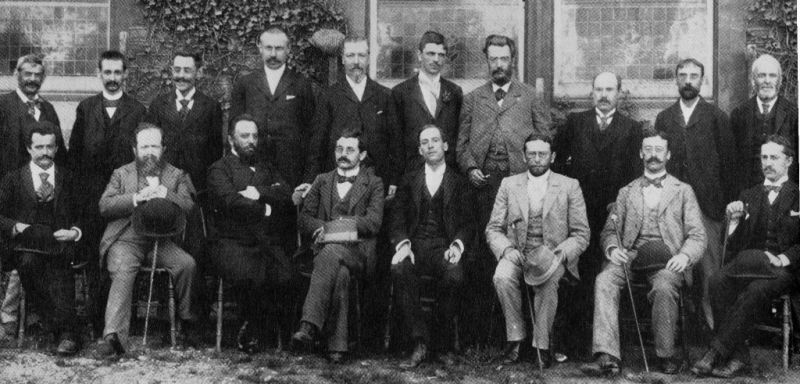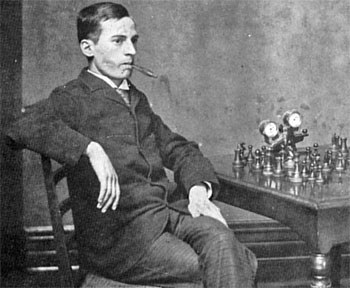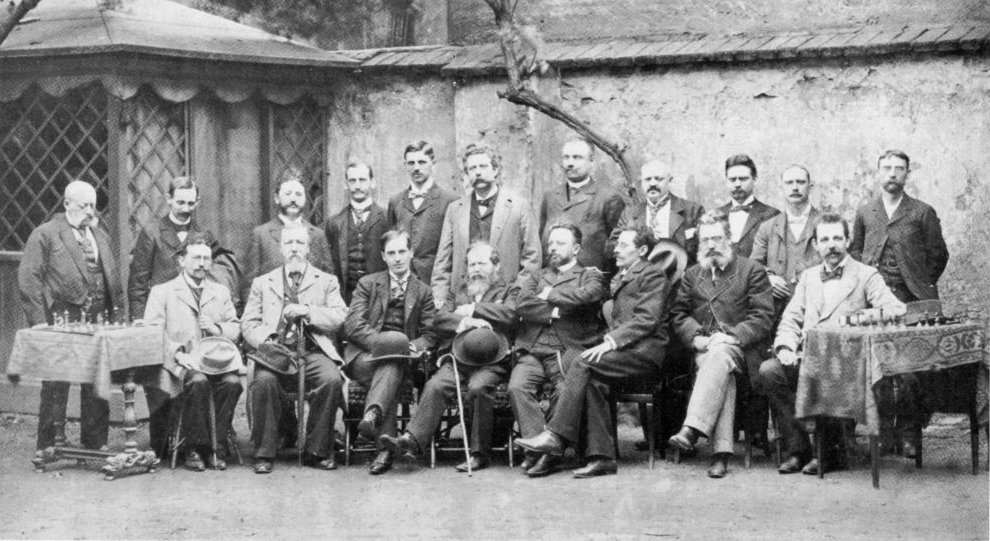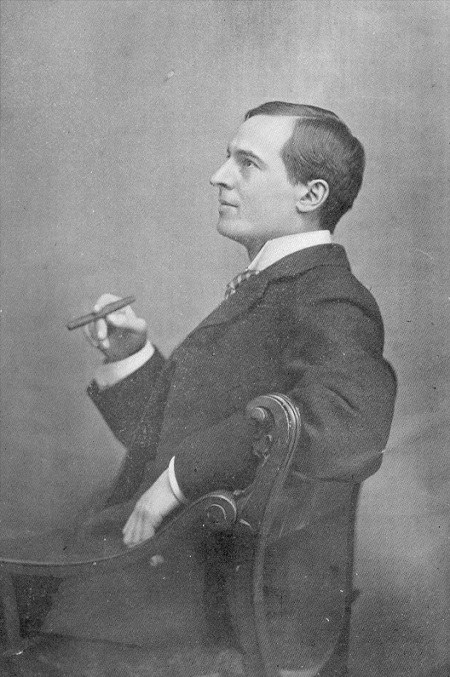


Between 1895 and 1904 Henry (Harry) Nelson Pillsbury was one of the best players of his time. He was born 145 years ago, on December 5, 1872 in Somerville, Massachusetts, a suburb of Boston. But he did not have a long life. On June 17, 1906, at the age of 33, he died of progressive paralysis, a severe neurological disorder resulting from syphilis. At the time of Pillsbury's death it was not known that syphilis can cause severe damage to the central nervous system, and often Pillsbury's performances in blindfold simultaneous events were cited as reason for Pillsbury's mental confusion at the end of his life.
Pillsbury's parents were both teachers. His father Luther Batchelder Pillsbury (1832-1905) taught at the Prescott Grammar School and later became deputy director at Somerville High School, where his son also received his education. Pillsbury's mother Mary A. (Leathe) Pillsbury (1838-1888) worked as a teacher and writer. Pillsbury had three older siblings, two brothers, Edwin and Ernest, and a sister, May. The family lived on Sargent avenue.
When Pillsbury was 15 years old his mother died, and following a proposal of his family he started to study chess to better cope with this loss.
After finishing school Pillsbury started to work in the advertising department of "Filene", a department store in Boston. In 1890 Pillsbury joined the Boston Deschapelles Chess Club which had been founded one year before. But the club soon disbanded and Pillsbury joined another chess club. Among his chess teachers were the problem composer Jonathan Hall from Boston and Henry Nathan Stone from Baltimore.
When he was 17 Pillsbury played his first chess tournament, the 4th Massachusetts Chess Association Tournament. His talent was outstanding and in 1892 he started to regularly give blindfold simuls, usually against eight opponents.
In April 1892, Wilhelm Steinitz visted Boston and played a handicap match against the young master. Steinitz gave Pillsbury odds of pawn and move and Pillsbury won two games against Steinitz's one.
In the following year Pillsbury won a couple of smaller matches in Boston, among others against the German players Carl August Walbrodt (1871-1902) and Arnold Schottlaender (1854-1909), who were touring the USA. Pillsbury won both matches 2½-½. Now Pillsbury decided to embark on a career as a chess player and went to Philadelphia where he joined the Franklin Chess Club. But Pillsbury was not only a strong chess player, he also had masters strength in checkers.
In September/October 1893 Pillsbury played his first masters tournament in New York. Fourteen players took part and Pillsbury finished in the middle of the field but defeated US National Champion Jackson Whipps Showalter. Emanuel Lasker dominated the tournament from beginning to end and won with a perfect 13.0/13, ahead of Adolf Albin. Shortly after his 21st birthday Pillsbury won the Masters' Manhattan Cafe Chess Tournament in New York, finishing ahead of Showalter and Albin.
In 1894, Pillbury moved to New York, became a member of the Brooklyn Chess Club and played for the club team in the Metropolitan League. As a chess journalist he annotated the games of the World Championship match between Lasker and Steinitz that was played from March to June 1894 in the US.
But he made a break from playing blindfold simuls because he often suffered from severe and long headaches afterwards. In October/November 1894 Pillsbury played his second great masters tournament in New York. Eleven players started, and Pillsbury shared fifth place. Steinitz won the tournament and the first prize of USD $125.
In June 1895 the Brooklyn Chess Club gathered USD $300 to send Pillsbury, as representative of the club, to the Hastings Chess Congress. Almost everybody who was anybody in the chess world and no less than 22 masters came to this tournament, including the reigning World Champion Emanuel Lasker and his predecessor Wilhelm Steinitz. Pillsbury started with a loss against Mikhail Chigorin but then won nine games in a row. In the end he won the tournament with 16½/21, ahead of Chigorin, Lasker, Tarrasch and Steinitz — a sensation. The 22-year old master had joined the world's elite and received USD $1,000 for his win (which today would be about $25,000).
After the Hastings tournament, Pillsbury stayed in England for a while and in the London Metropolitan Club he gave a simul against 15 women players whom he all gave knight odds. Pillsbury liked to visit women's tournaments, regularly played small simultaneous events against women and enjoyed being admired (see Pillsbury and the Ladies). On his return to the USA, the winner of Hastings was celebrated like a national hero and the mayor of Boston presented him with a golden watch. American chess clubs started to add Pillsbury's name to their own.

The participants of Hastings 1895. Pillsbury is sitting in the middle of the front row, between Lasker and Tarrasch | Photo: Horace F. Cheshire [Public domain], via Wikimedia Commons
| Rg. | Name | 1 | 2 | 3 | 4 | 5 | 6 | 7 | 8 | 9 | 10 | 11 | 12 | 13 | 14 | 15 | 16 | 17 | 18 | 19 | 20 | 21 | Pts. | |
| 1 | Harry Nelson Pillsbury | 0 | 0 | 1 | 1 | 1 | 1 | 1 | 0 | ½ | ½ | 1 | 1 | 1 | 1 | 1 | ½ | 1 | 1 | 1 | 1 | 1 | 16.5 | |
| 2 | Mikhail Ivanovich Chigorin | 1 | 1 | 1 | 0 | 0 | 1 | 1 | 1 | 1 | ½ | 0 | 1 | 1 | 1 | ½ | 1 | ½ | 1 | 1 | ½ | 1 | 16.0 | |
| 3 | Emanuel Lasker | 1 | 0 | 0 | 1 | 1 | 1 | 0 | 1 | 0 | 1 | 1 | 1 | ½ | 1 | 1 | 1 | ½ | 1 | 1 | ½ | 1 | 15.5 | |
| 4 | Siegbert Tarrasch | 0 | 0 | 1 | 1 | 1 | 0 | ½ | ½ | 1 | 1 | 1 | 1 | 0 | ½ | 1 | 1 | 1 | 0 | 1 | ½ | 1 | 14.0 | |
| 5 | William Steinitz | 0 | 1 | 0 | 0 | 1 | ½ | 1 | ½ | 1 | 1 | 0 | ½ | 1 | 1 | 0 | 1 | 1 | 0 | 1 | ½ | 1 | 13.0 | |
| 6 | Emanuel Stepanovich Schiffers | 0 | 1 | 0 | 0 | 0 | ½ | ½ | 0 | 1 | 1 | 1 | ½ | ½ | 1 | 1 | ½ | 0 | 1 | 1 | ½ | 1 | 12.0 | |
| 7 | Richard Teichmann | 0 | 0 | 0 | 1 | ½ | ½ | ½ | ½ | 0 | 0 | ½ | 1 | 1 | 0 | 1 | 1 | ½ | ½ | 1 | 1 | 1 | 11.5 | |
| 8 | Curt Von Bardeleben | 0 | 0 | 1 | ½ | 0 | ½ | ½ | ½ | 0 | 0 | ½ | 1 | 1 | 1 | ½ | 1 | ½ | 1 | 0 | 1 | 1 | 11.5 | |
| 9 | Carl Schlechter | 1 | 0 | 0 | ½ | ½ | 1 | ½ | ½ | ½ | ½ | 0 | 1 | 1 | ½ | ½ | ½ | ½ | ½ | 1 | ½ | 0 | 11.0 | |
| 10 | Joseph Henry Blackburne | ½ | 0 | 1 | 0 | 0 | 0 | 1 | 1 | ½ | 0 | 1 | 1 | 0 | 0 | ½ | 0 | 1 | 1 | 1 | 0 | 1 | 10.5 | |
| 11 | Carl August Walbrodt | ½ | ½ | 0 | 0 | 0 | 0 | 1 | 1 | ½ | 1 | 0 | 0 | ½ | ½ | ½ | ½ | 0 | ½ | 1 | 1 | 1 | 10.0 | |
| 12 | Dawid Markelowicz Janowski | 0 | 1 | 0 | 0 | 1 | 0 | ½ | ½ | 1 | 0 | 1 | 0 | ½ | 0 | ½ | 1 | 0 | ½ | 0 | 1 | 1 | 9.5 | |
| 13 | Amos Burn | 0 | 0 | 0 | 0 | ½ | ½ | 0 | 0 | 0 | 0 | 1 | 1 | 0 | 0 | ½ | 1 | 1 | 1 | 1 | 1 | 1 | 9.5 | |
| 14 | James Mason | 0 | 0 | ½ | 1 | 0 | ½ | 0 | 0 | 0 | 1 | ½ | ½ | 1 | 0 | 1 | 0 | ½ | 1 | 0 | 1 | 1 | 9.5 | |
| 15 | Isidor Gunsberg | 0 | 0 | 0 | ½ | 0 | 0 | 1 | 0 | ½ | 1 | ½ | 1 | 1 | 1 | 0 | ½ | 1 | 0 | 0 | 1 | 0 | 9.0 | |
| 16 | Henry Edward Bird | 0 | ½ | 0 | 0 | 1 | 0 | 0 | ½ | ½ | ½ | ½ | ½ | ½ | 0 | 1 | ½ | 1 | 0 | ½ | ½ | 1 | 9.0 | |
| 17 | Georg Marco | ½ | 0 | 0 | 0 | 0 | ½ | 0 | 0 | ½ | 1 | ½ | 0 | 0 | 1 | ½ | ½ | 1 | 1 | 0 | 1 | ½ | 8.5 | |
| 18 | Adolf Albin | 0 | ½ | ½ | 0 | 0 | 1 | ½ | ½ | ½ | 0 | 1 | 1 | 0 | ½ | 0 | 0 | 0 | 0 | 1 | 1 | ½ | 8.5 | |
| 19 | William Henry Kraus Pollock | 0 | 0 | 0 | 1 | 1 | 0 | ½ | 0 | ½ | 0 | ½ | ½ | 0 | 0 | 1 | 1 | 0 | 1 | 0 | 0 | 1 | 8.0 | |
| 20 | Samuel Tinsley | 0 | 0 | 0 | 0 | 0 | 0 | 0 | 1 | 0 | 0 | 0 | 1 | 0 | 1 | 1 | ½ | 1 | 0 | 1 | 0 | 1 | 7.5 | |
| 21 | Jacques Mieses | 0 | ½ | ½ | ½ | ½ | ½ | 0 | 0 | ½ | 1 | 0 | 0 | 0 | 0 | 0 | ½ | 0 | 0 | 1 | 1 | 1 | 7.5 | |
| 22 | Beniamino Vergani | 0 | 0 | 0 | 0 | 0 | 0 | 0 | 0 | 1 | 0 | 0 | 0 | 0 | 0 | 1 | 0 | ½ | ½ | 0 | 0 | 0 | 3.0 |
In December 1895 Pillsbury went to Russia to play in the Four-Masters-Tournament in St. Petersburg. Initially, the five best players of that time had been invited but Tarrasch cancelled on short notice and thus only Emanuel Lasker, Wilhelm Steinitz, Mikhail Chigorin and Henry Pillsbury battled it out. Each player had to play six games against the three others. After 9 of 18 rounds Pillsbury led and was one point ahead of Lasker, but then fell ill and was plagued by headaches, insomnia, and symptoms typical for the flu. In the end Pillsbury finished third while Lasker won with 11½/18.
The crucial between Lasker and Pillsbury was played in round 10. It was the fourth game between Lasker and Pillsbury. Pillsbury had won two of the previous games, one ended in a draw. But in the crucial game Lasker played fantastic chess and won with a beautiful attack. After this defeat Pillsbury lost another five games in a row.
Garry Kasparov annotated the game for the ChessBase Mega Database:
Apparently, Pillsbury infected himself with syphilis when visiting a prostitute. The symptoms described above were probably caused by the infection. At that time syphilis was a wide-spread sexual disease that was fatal and could not be cured.
After his return to the USA Pillsbury was invited to take part in an experiment. Before a blind simultaneous event he was asked to remember 30 words. After the four hour long simultaneous he was asked to repeat them.
Here are the 30 words of the list:
Antiphlogistine, Periosteum, Takadiastase, Plasmon, Ambrosia, Threlkeld, Streptococcus, Staphylococcus, Micrococcus, Plasmodium, Mississippi, Freiheit, Philadelphia, Cincinatti, Athletics, No War, Etchenberg, American, Russian, Philosopy, Piet Potgleter's Rost, Salmagundi, Oomisillecootsi, Bangmanvate, Schlechter's Neck, Manzinyama, Theosophy, Catechism und Madjescomalops.
 Pillsbury looked at the list for about one minute and had no trouble at all to recite the words after the simul. The next he still remembered all the words. This ability seems to be due to a photographic memory, and Pillsbury is not the only strong chess player with such a memory. Similar stories are told about Bobby Fischer or Vassily Ivanchuk. Some chess players have a fantastic memory which helps them to learn new languages easily. The Czech grandmaster David Navara, for example, knows 15 languages and if necessary he probably could easily add another one to his repertoire.
Pillsbury looked at the list for about one minute and had no trouble at all to recite the words after the simul. The next he still remembered all the words. This ability seems to be due to a photographic memory, and Pillsbury is not the only strong chess player with such a memory. Similar stories are told about Bobby Fischer or Vassily Ivanchuk. Some chess players have a fantastic memory which helps them to learn new languages easily. The Czech grandmaster David Navara, for example, knows 15 languages and if necessary he probably could easily add another one to his repertoire.
Pillsbury later added the memory stunt with the 30 words to his simuls. During a break he asked the participants to create a list with 30 words and after a short look on the list he later recited it completely and without any errors. Pillsbury also fell into the habit of smoking Havana cigars and drinking whiskey during his blindfold simultaneous exhibitions which gave him the air of a dandy. And he no longer had headaches after his blindfold exhibitions.
In the summer of 1896 Pillsbury was one of the 19 players at the International Tournament in Nuremberg. He won against Lasker, Tarrasch, Chigorin and finished fourth. Lasker won the tournament. Pillsbury later said that he was already suffering from symptoms which usually occur after a stroke: numbness, confusion, dizziness.
In October 1896 he took part at a tournament in Budapest and finished third behind the highly talented Rudolf Charousek, who also died young, and Mikhail Chigorin. After his return to the US Pillsbury regularly gave blindfold exhibitions, and he was also one of the players who operated the Ajeeb. This automaton, constructed by Charles Hooper, who was a carpenter by profession. was a lesser known variation of "The Turk" - the famous chess automaton which seemed to play by itself but in which a human chess player was hidden. The Ajeeb was regularly shown in museums and exhibitions and defeated almost every one of his opponents. Between 1898 and 1904 Pillsbury regularly hid inside the Ajeeb, receiving a fee of 70 USD per week for his services.
In June 1898 Pillsbury shared first place with Tarrasch at the Kaiser Franz jubilee tournament in Vienna, which was sponsored by the wealthy Albert Freiherr von Rothschild, who was a passionate chess fan and supported many tournaments.

Participants of the Vienna tournament, 1898. Pillsbury is sitting in the front row, third from the left, next to Steinitz
The tournament was played in the rooms of the "Wiener Schachgesellschaft" in the Schottengasse 7. Tournament director was Hugo Fähndrich, who later also published a fine tournament book about the event. Tarrasch and Pillsbury shared first place and played a tiebreak match to decided the winner - and this match ended in favour of Tarrasch.
In May 1899 Pillsbury played the London International Chess Congress, a supertournament which Lasker won by a huge margin. Pillsbury shared second to fourth place with Geza Maroczy and Dawid Janowski. Frank Marshall won the B-tournament.
In the following year, in February 1900, Pillsbury tied the blindfold simultaneous record of Johannes Zukertort and played in Chicago against 16 players simultaneously (+11, -1, =4). In March 1900 he broke the record and played in New Orleans against 17 opponents at the same time, and in April 1900 he even managed to play 20 opponents simultaneously.
In late summer of the same year he travelled to Europe again to play at the tournament in Paris which Lasker won convincingly. Pillsbury finished second, ahead of Marshall and Geza Maroczy. From Paris Pillsbury went to Munich to play in the Master Tournament of the 12. Congress of the German Chess Federation. Pillsbury shared first with Maroczy and Carl Schlechter and drew the tiebreak match with Schlechter (Maroczy fell ill and did not play the tiebreak).
 In January 1901 Pillsbury married Mary Ellen Bush, the daughter of a judge. He also started negotiations with Lasker about a possible World Championship match which, however, led to nothing.
In January 1901 Pillsbury married Mary Ellen Bush, the daughter of a judge. He also started negotiations with Lasker about a possible World Championship match which, however, led to nothing.
And Pillsbury made his blindfold simultaneous exhibitions even more difficult. He played blindfold chess against twelve opponents, while also playing blindfold checkers on four boards and blindfold Whist at several tables - he memorised the cards after a short look at them.
At the tournament in Monte Carlo 1902 Pillsbury again shared second place with Dawid Janowski, this time behind Geza Maroczy. After the tournament he gave a couple of blindfold simultaneous exhibitions in Germany and England and in July 1902 he played at the 13. Chess Congress of the German Chess Federation where he finished second behind Dawid Janowski.
But he used the rest day to set a new record in blindfold simultaneous play in Hannover. He played against 21 opponents and some of them - e.g. Ossip Bernstein, Carl Carls, Bernd Kagan, Hans Fahrni or Eduard Dyckhoff - were quite strong. Pillsbury won 3 games, drew 11 and lost 7. After blindfold exhibitions in Berlin and Munich he went to Moscow where he broke his own blindfold simultaneous record by playing 22 oppoents. Pillsbury won 17 games, lost one and drew four. One of the enthusiastic spectators was the ten-year-old Alexander Alekhine who after the exhibition wanted one day to be able to play chess like the young American.
Pillsbury's next tournament was Monte Carlo where he finished third behind Tarrasch and Maroczy. In May he played the theme tournament in which the players had to play the King's Gambit Accepted and finished fourth behind Chigorin, Marshall and Marco.
In January 1904 he gave a blindfold simul against 16 opponents. And at the Mechanics' Institute Chess Club in San Francisco he again played blindfold chess against 16 opponents, blindfold checkers against 4 opponents and 6 hands of Whist blindfold.
In April/May 1904 Pillsbury played his last big tournament, in Cambridge-Springs. Though he managed to beat Lasker he finished only ninth. Marshall won the tournament. By now Pillsbury was markedly affected by his disease. He suffered from permanent headaches and restlessness and barely managed to play the tournament to its end. After the tournament he played only two more games in his life. He wrote the chess column for the Philadelphia Inquirer because he needed money but felt unable to give simultaneous exhibitions.
On March 1, 1905 Pillsbury was hospitalised and is said to have tried to throw himself out of a window. On March 7, 1905 he suffered a stroke. On March 27, 1905, he had an operation in the im Presbyterian Hospital in Philadelphia which apparently helped him a bit because on May 13, he gave another simultaneous exhibition. In November 1905 he went to the Bermudas with his wife to recuperate but suffered another stroke. One more stroke followed in March 1906 and on June 17, 1906 Pillsbury died at the age of 33 at the Frankford Hospital in Frankford, which today is a part of Philadelphia. He was buried at the Laurel Hill Cemetery, in Reading, Massachusetts.
With the exception of Chigorin and Blackburne Pillsbury had a positive score against all top players of his time, even against Lasker. According to Jeff Sonas' historical ratings between 1903 and 1904 Pillsbury was number one in the world, in the years before he was the world's number two. During his short life Pillsbury played more than 1,000 blindfold games.
In his obituary in the New York Times Lasker disagreed with the erroneous belief that to play chess intensively would negatively affect the mind and the reason for Pillsbury's mental disorder:
Pillsbury, the American chess champion, died last Sunday (June 17, 1906). The cause of his premature departure was a stroke of apoplexy. The mechanism of his brain had become defective. With the examples of Morphy and Steinitz in their minds, many writers have commented on the tendency of famous chess players to insanity. A general belief has consequently been engendered that chess playing, or any very intensive purely mental occupation disorganizes the intellect. But this belief is entirely unfounded. It is in the highest degree mischievous.
Pillsbury had exceptional intellectual abilities and a fantastic memory but died from an illness which could not be cured at his time. With a bit more luck he might have become World Champion. Numerous books have been published about Pillsbury and his fantastic performances. The Dutch band "Eton Crop" remembered Harry Nelson Pillsbury with a song on their album "Peel Sessions 1983-88" (https://etoncrop.bandcamp.com/track/harry-nelson-pillsbury-3).
Translation from German: Johannes Fischer